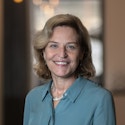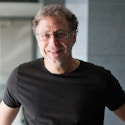On May 21, 2021, David Ledbetter and Joseph Buxbaum discussed whether there are genes for which mutations confer risk specific to autism or whether these genes are really conferring general risk of disrupted brain development. The discussion was moderated by Heather Mefford.
About the Panel
The scientific literature is replete with references to ‘autism risk genes,’ but the phrase likely means different things to different people. Are there genes for which mutations confer risk that is completely specific to autism, or are they all really conferring general risk of disrupted brain development? Are current data sufficient to identify gene mutations that are somewhat more likely to confer risk of one versus the other, or is even this effort premature? What do the answers to these questions tell us about the current value of clinical testing for ‘autism genes,’ what we can fairly ask of animal models, and what are the best ways to design future genetic studies of the condition? In this panel, David Ledbetter and Joseph Buxbaum will discuss these and other issues that stem from a recent debate published in the American Journal of Human Genetics1-3. The panel discussion was moderated by Heather Mefford.
David Ledbetter, Ph.D.
Talk title: No autism genes, just brain genes
Joseph Buxbaum, Ph.D.
Talk title: Which brain-expressed genes are most relevant to the core features of autism and why?
Inquiries: [email protected]
About the Speakers
David Ledbetter is currently the chief clinical officer at Dascena, a precision medicine technology company. He is the former executive vice president and chief scientific officer at Geisinger, an integrated health system in Pennsylvania. Previously, he held academic and leadership positions at Emory University, the University of Chicago and the National Center for Human Genome Research at the National Institutes of Health (NIH). He is a graduate of Tulane University and earned his Ph.D. at the University of Texas-Austin. He is an internationally recognized expert in genomics and precision medicine, having focused his early research efforts on discovering the genetic causes of childhood neurodevelopmental disorders such as autism, as well as the translation of new genomics technologies into clinically useful genetic tests for early diagnosis and intervention. His current research interest includes leveraging longitudinal electronic health information with large-scale DNA sequencing to determine the clinical utility and cost-effectiveness of precision medicine approaches in a real-world health system setting.
Joseph Buxbaum is a professor of psychiatry, genetics and genomic sciences, and neuroscience, and he serves as the director of the Seaver Autism Center for Research and Treatment and is the vice chair of research and mentoring for the department of psychiatry. Buxbaum is a renowned molecular neuroscientist whose research aims to understand the molecular and genetic basis of autism spectrum disorder and associated neurodevelopmental conditions, with the goal of developing novel therapeutics. He is a founder and communicating principal investigator of the Autism Sequencing Consortium, currently analyzing whole-exome sequencing from 60,000 individuals to identify autism spectrum disorder (ASD) genes. In addition, his lab has numerous human stem cell lines ongoing and has characterized more than a dozen rodent models for ASD and associated conditions. Buxbaum received his B.Sc. in mathematics and biology from Touro College, and his M.Sc. and Ph.D. in neurobiology from the Weizmann Institute of Science in Israel. He completed a postdoctoral fellowship in molecular and cellular neuroscience at the Rockefeller University. He was elected to the National Academy of Medicine in 2015 and was elected a fellow of the International Society for Autism Research in 2019. He is the author of more than 300 publications, and he is co-editor-in-chief of the journal Molecular Autism.
Heather Mefford is a physician scientist with training in pediatrics and human genetics. The overarching goal of her lab is to identify and characterize genetic causes of pediatric disease, with a primary focus on the severe pediatric epilepsies and related neurodevelopmental disorders. She applies state-of-the-art genome-wide technologies to identify disease-associated genetic, genomic and epigenetic variants, followed by clinical and molecular characterization of novel genetic disorders. Using these approaches, her research highlights new genes and pathways important in brain development and epileptogenesis.


